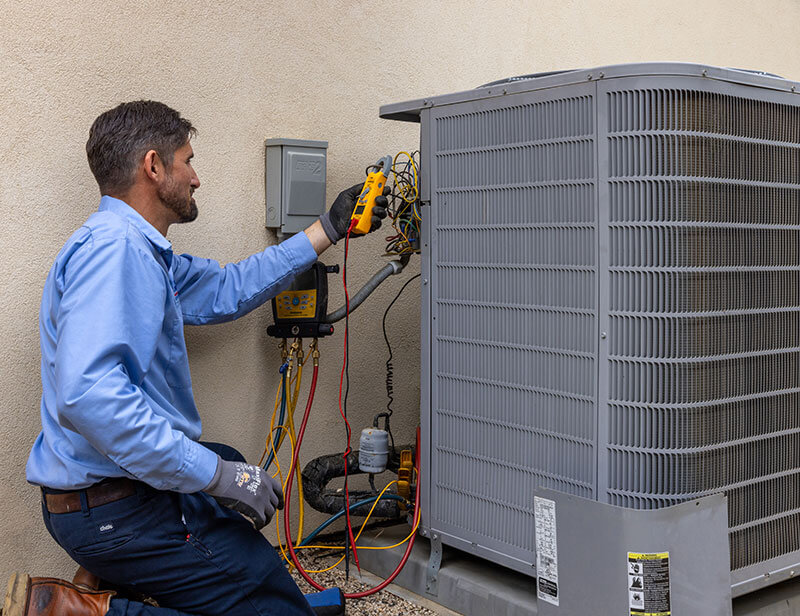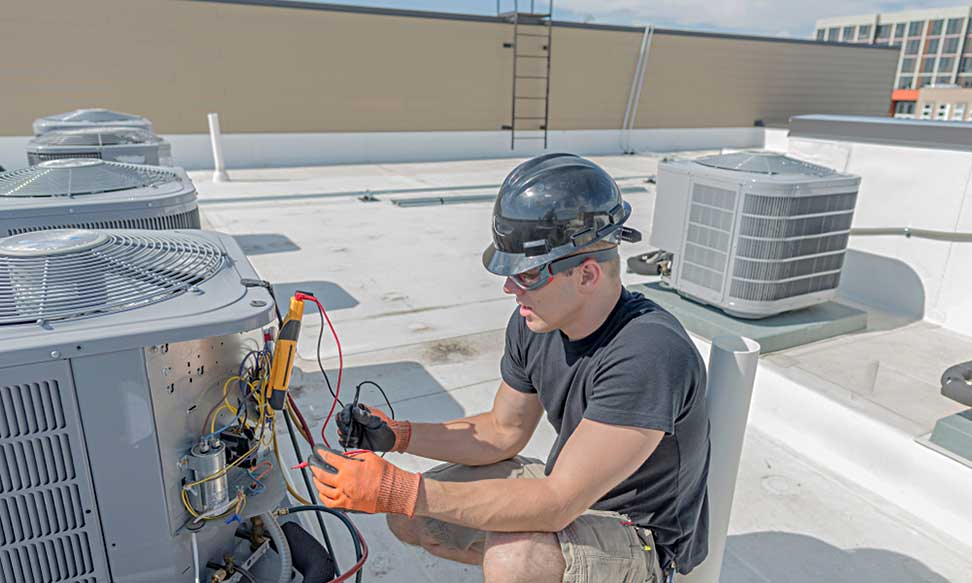Recognizing A/c: A Comprehensive Overview to Heating, Ventilation, and Cooling Provider
In today's quickly evolving globe, a basic understanding of a/c systems is no much longer a high-end but a necessity for ensuring optimal interior atmospheres. This guide provides a complete exploration of heating, ventilation, and air conditioning solutions, debunking the complex interplay of parts that regulate comfort and effectiveness. As we navigate via the details of selecting the appropriate system and maintaining it for peak efficiency, one starts to realize the profound effect these systems carry energy intake and sustainability. What typical challenges could be weakening your heating and cooling system's potential without your expertise?
Fundamentals of Cooling And Heating Systems
Home Heating, Ventilation, and Cooling (HVAC) systems are crucial components in modern-day architecture, continually making certain optimum indoor air quality and thermal comfort. These systems are important to maintaining the health, productivity, and health of passengers in property, commercial, and industrial setups. At their core, a/c systems are designed to manage the temperature, moisture, and cleanliness of air, developing a comfortable atmosphere despite external climate condition.
The standard parts of a HVAC system include heating systems, air flow air ducts, and air conditioning systems. Air flow, an important element of the system, entails the exchange of interior and exterior air, controlling and minimizing indoor contaminants moisture degrees.

Choosing the Right HVAC System
Picking a Cooling and heating system involves a careful balance of effectiveness, viability, and price to the details requirements of a building. It is important to consider the environment of the area, as this will influence the type of system that best maintains comfy indoor temperature levels throughout the year.
Energy efficiency rankings, such as SEER (Seasonal Energy Performance Ratio) for ac system and AFUE (Yearly Fuel Usage Performance) for heating systems, are crucial elements when assessing possible systems. Greater scores typically show better effectiveness and reduced operating expenses gradually. Additionally, potential customers should compare ahead of time costs with prospective long-lasting financial savings to identify the ideal economic choice.
One more essential factor to consider is the sort of system-- whether a central system, split system, or ductless mini-split is ideal. Each deals distinct benefits and constraints, reliant on installment intricacy and space demands. Appointment with a/c professionals is advisable to guarantee that the system chosen lines up with both the structure's specs and the owners' comfort preferences.
Importance of Regular Upkeep
Once the appropriate HVAC system is picked and installed, preserving its performance and longevity becomes a top priority. Normal upkeep is important for making sure that the system operates at peak performance, minimizing the danger of unexpected failures. Routine evaluations and maintenance can identify prospective issues before they escalate right into costly fixings or replacements, therefore expanding the life-span of the equipment.

Moreover, sticking to an upkeep routine can preserve the guarantee protection, as numerous manufacturers call for evidence of routine servicing to recognize guarantee claims. Engaging specialist cooling and heating technicians for regular upkeep ensures that all parts are analyzed precisely and adjusted as required. This positive approach not just safeguards the investment in the heating and cooling system but additionally promotes a much healthier indoor environment for passengers, enhancing total health.
Enhancing Energy Performance
To improve energy performance in heating and cooling systems, it is important to execute strategies that decrease power usage while maintaining optimal efficiency. One efficient technique is the combination of wise thermostats, which permit exact control over temperature level setups based upon tenancy and time of day. These devices can find out patterns and adjust home heating and cooling down routines accordingly, decreasing unneeded energy usage.
One more approach includes regular examination and cleaning of HVAC elements, such as air filters, coils, and ductwork. Tidy systems operate much more efficiently, as dirt and debris can block air movement and force the system to work harder, taking in even more power. Guaranteeing appropriate insulation and securing is additionally vital, as it avoids power loss and reduces the tons on a/c systems.
Additionally, upgrading to energy-efficient tools, such as variable-speed motors and high-efficiency compressors, can dramatically cut energy usage. These parts adjust their speed and outcome to match the specific home heating or cooling down demand, protecting against power wastefulness.
Purchasing power recovery ventilation systems can also enhance efficiency by exchanging heat between outgoing and incoming air streams, reducing the requirement for extra heating or air conditioning. By taking on these steps, a/c systems can accomplish premium energy effectiveness, leading to reduced operational expenses and environmental impact.
Troubleshooting Common Issues
When addressing HVAC system malfunctions, a structured approach to troubleshooting can efficiently determine and resolve common issues. Blocked or filthy filters restrict air flow, decreasing system performance and might lead to getting too hot or cold.
Check the breaker and integrates; stumbled breakers or blown merges can stop system operations. In addition, analyze the exterior system for any kind of obstructions or debris that can hinder efficiency. Normal upkeep of these components can stop many typical troubles.
Pay attention for unusual sounds, which might indicate mechanical problems such as worn-out belts or electric motor troubles. Inexplicable boosts in power costs can also signal underlying inadequacies or leakages in ductwork. Ensure link that all vents are open and unblocked to help with ideal air flow.

Specialist treatment ends up being required if these steps do not fix the problem, particularly for intricate problems like refrigerant leaks or electric mistakes. Regular inspections and upkeep by additional hints licensed service technicians can preemptively address possible concerns, guaranteeing the heating and cooling system runs effectively and dependably.

Conclusion
To conclude, an extensive understanding of a/c systems is critical for ensuring optimal indoor comfort and air quality. By selecting the appropriate system based on details structure needs, the performance and sustainability of air flow, air, and home heating conditioning solutions can be maximized. Regular upkeep is important for maintaining system efficiency and long life, while power efficiency can be considerably enhanced via informed techniques. Attending to common concerns with efficient fixing further makes certain the reliable procedure of a/c systems, benefiting both services and house owners.
As we browse through the ins and outs of picking the ideal system and preserving it for peak efficiency, one begins to recognize the extensive impact these systems have on power intake and sustainability.Heating, Ventilation, and Air Conditioning (COOLING AND HEATING) systems are pivotal elements in modern-day architecture, constantly making certain optimal indoor air top quality and thermal convenience (Heating Contractor in Brownwood TX).Another essential factor to consider is the kind of system-- whether a central system, split system, or ductless mini-split is ideal. Tidy systems run a lot more efficiently, as dust and debris can block air click for source movement and force the system to work harder, consuming more energy.In conclusion, a detailed understanding of HVAC systems is important for ensuring optimal indoor comfort and air high quality